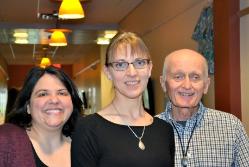"Around the College" is no longer being updated.
View current SUNY Empire Stories.
May 12, 2017
Master’s Capstone Project, “In the Shadow of the Twenty,” Tells the Story of How World War II and the Cold War Kept Newlyweds Apart for 20 Years

More than 35 people attended an opening reception for “In the Shadow of the Twenty,” an exhibition of family history reinterpreted through photographs and memoir, created by graduate student Kristina Kwacz.
The exhibit will be on display through May 31, at the college’s location at 113 West Ave., Saratoga Springs, and tells the remarkable story of her family.
During the early 1910s, Kwacz’s maternal grandparents immigrated independently to America from Polish territory annexed (partitioned) by neighboring countries. Introduced to each other by a family member, John Kolenda and Emilia Lawkiel were married and settled in western Pennsylvania. Kwacz’s mother, Katarzyna Kolenda, was the third of four children born to the couple in the U.S. In the years following WWI, Poland reemerged as an independent nation and, in 1922, the entire family sailed back over the Atlantic Ocean, resettling in eastern Poland when Katarzyna was only three.
As she grew, Katarzyna sought to return to America with its opportunities for a better life. A U.S. citizen, she was an eligible bride at a time when arranged marriages were not uncommon in rural Poland.
The Kolendas made such an arrangement for Katarzyna with the Kwacz family for their son Wladyslaw, and the two were married in January 1939. Less than a month after their wedding, Katarzyna sailed for the states, with Wladyslaw to follow at a future date.
Nazi Germany’s invasion of Poland in September 1939 changed everything. World War II and The Cold War ultimately kept the newlyweds apart for 7,302 days. Even after the defeat of the Nazis in April 1945, Wladyslaw’s efforts to join his wife were stymied by Poland’s communist government, which denied him a visa again and again.
Two decades after his bride set sail for America, he finally was able to leave Poland on a short-term visa to visit a cousin in New Jersey for a vacation. Husband and wife were reunited and two years later, at the age of 41, Katarzyna, now Katherine Kwacz, gave birth to Kristina.
Three trips to Poland with her mother during the 1970s sparked Kristina’s interest in and love for the country, which she began photo-documenting during travels there as an adult. She has exhibited these photographs in solo and group exhibitions since 1996.
The current exhibition at 113 West Ave. draws upon the Kwacz family photo collection instead, with at least one image reproduced on each of 15 panels, accompanied by Kristina’s reflective narrative. Three supplemental panels of documents and shadow boxes containing personal items that directly relate to the images and text of the panels are also on display. The exhibition is Kwacz’s capstone project for the completion of her Master of Arts in Liberal Studies degree.
“This exhibit is particularly exciting because it combines several aspects of Kristina’s interdisciplinary scholarship,” said Assistant Professor Anastasia Pratt, Kwacz’s primary faculty mentor. “From the strong grounding in Polish history to the theoretical underpinnings of visual culture, the exhibit offers a sense of the manner in which family histories intertwine with regional and national histories, and lead to very personal understandings of the past.”
“This project would not have been developed were it not for the flexibility and creativity afforded by the Master of Arts in Liberal Studies program at SUNY Empire State College,” Kwacz said. “The scholarly framework allowed me to conduct independent research to consider the political, economic, cultural and social factors that influenced my parents’ options and choices during the period I refer to as ‘The Twenty.’ This, and inspiration sparked by Mentor Anastasia Pratt, opened the door to the creation of a unique and very personal exhibition.”
Kwacz’s research paper, “Pilgrimage, Partitions, and Patriarchy: Polish Women and the Virgin Mary,” also was recently published in Confluence, The Journal of Graduate Liberal Studies.
She presented another research paper, “Terror, Trauma and Totalitarianism: Lifting the Veil of Silence, ” which explores Joseph Stalin’s reign of terror throughout the “Kresy” (Poland’s Eastern borderlands during WWII), at several conferences in the Northeast.
Kwacz is the recipient of three scholarships, the Empire State College Foundation Susan and Bill Dake Scholarship, the Skalny Scholarship for Polish Studies from the American Council for Polish Culture and the Empire State College Margaret C. “Peggy” Perkins Memorial Scholarship.
A 2017 recipient of the SUNY Chancellor’s Award for Student Excellence and the college’s School for Graduate Studies Dean’s Medal, she will be one of the student speakers featured at the college’s Albany commencement event this spring.
Kwacz, the director of state Senator Michael Gianaris’ Albany office, graduates with a 3.98 GPA.
